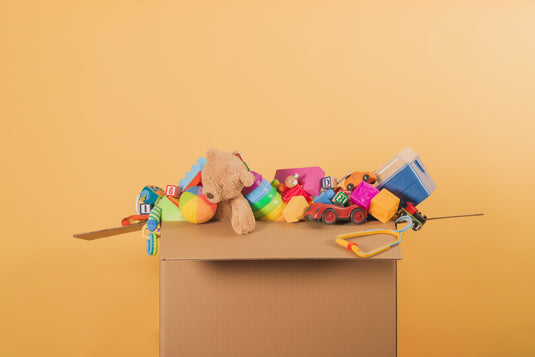This blog post follows up from the previous post with a fifth way to support bereaved parents. We’re going to take a more in depth look at this one:
5. Help with next steps for their child’s belongings.
Our son, Travis Jr., died after we’d already had our baby shower and received loads of gifts from our registry. Many of these gifts - including large items like strollers, car seats, the crib, and more - were still in boxes in our foyer, as Travis Jr.’s dad had been planning to move them all upstairs the upcoming weekend.
Travis Jr.’s mom had been planning to pack her hospital bag that same weekend. But those opportunities never came. Instead, that weekend, we found ourselves in the hospital with our stillborn son.
Upon returning home from the hospital, we would’ve had to walk through our foyer, piled high with gifts that our son would no longer be able to use. So, in order to avoid having us face the extra pain of seeing all of these baby items after our baby’s death, our family took on the arduous task of packing away all the gifts - lifting them up multiple flights of stairs, arranging them neatly in another room in our house, and closing the door.
To support your loved one who has lost a child, ask if you can help them with whatever they would like to do with their child’s belongings - ask, and don’t make assumptions about what approach they may desire.
A few example scenarios
Maybe the parents had already set up the baby’s bassinet and belongings in the parent’s bedroom. You can ask if they would like you to help move those items elsewhere, or if they would prefer to keep those items in the room with them.
Gently provide multiple options and don’t assume one approach or another. For example, if you only offer to remove the items, some parents may view this as you trying to erase the memory of their child. On the other hand, some parents may see the empty bassinet in their room as a punch-in-the-gut reminder of their baby’s death and may, therefore, prefer to have the bassinet removed from their room.
Maybe the child was older with their own room, or sharing a room with a sibling, and had items they used every day. Again, ask the parents what they’d like to do with the child’s belongings.
Some parents may want to keep everything "just the way it is," or "just the way it was," before their child's death. Some parents will hold on to specific items dearly, such as clinging to their child’s favorite toy or a tee-shirt that has the scent of their child.
Other parents may want help packing all of their child’s items in a separate room or temporarily removing them from the home until they are ready to see those items again.
Still other parents may choose to more permanently remove their child’s items from their home through a method such as donating them. You can help by finding an organization to donate these items to and coordinating a team of trusted supporters to physically help with the process.
A note on timing
Be sensitive as to the timing of when you ask. For example, in our case, our son’s items would have been right in our face the moment we arrived home, so it made sense for our family to ask and move the items before we left the hospital.
In other situations, it may be better to ask a few days, weeks, or months after the child’s death, to give the parents more time to begin processing the grief and think about what they’d prefer to do with their child’s belongings.
A note on what not to do
We personally had an experience where someone offered to help us return all of the registry gifts to Amazon. While their intent was kind and some parents may have accepted the offer to return the gifts, it felt offensive to us. It felt as though they were saying, “You didn’t get to keep your baby, so you don’t get to keep these gifts either. Return the gifts and give everyone their money back.”
Instead, we said that we would be keeping the gifts and hoping to use them for a future sibling - just as Travis Jr.’s future siblings would have gotten to use his “hand-me-downs.”
Therefore, in seeking to help, don’t just present one option. Keep these types of sensitivities in mind, keep your offer open-ended, and present multiple options for how you may help.
Example language to offer help
“Is there a way I can help you with [child’s name’s] belongings? For example, I could….[choose appropriate suggestions, such as those described in this blog post]. Please let me know whatever you’d like me to help with, whether in the near term or later on.”
In summary, supportive loved ones can ask bereaved parents what their preference is regarding their child’s belongings, avoid making assumptions, and then offer to help with whatever approach the parents choose.
***
More blog posts are coming with more ideas on how to support bereaved parents. Subscribe to our newsletter below to be updated when each post is released, and share with someone who can benefit from this information.

